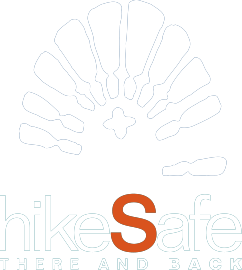Accidents happen to even the most experienced and best prepared hikers. That's why it's important that you know the terrain, know how to stay warm and dry, know first aid and know how to rescue yourself if you're injured or become sick on the trail. Most of all, you should never hike alone.
The Gear essentials are crucial to dealing with injuries and affliction. It is the gear you thought you’d never need that will keep you safe and get you home in a tough situation.
As a general rule, to stay safe you should pace yourself, not overexert, rest often, drink plenty of water and eat regularly throughout your hike. There are, however, some specific injuries and afflictions that you need to be aware of so that you can deal with them.
Falls
- These typically account for more fatalities than any other hiking incident.
- Most falls and injuries occur when hikers are descending a trail. Wet rocks and leaves have contributed to many ankle injuries in the backcountry.
- Hiking poles can help with stability by adding an additional point of contact with the trail.
Heat Exhaustion
- This, and other heat related illnesses can result from overexertion on the trail.
- Symptoms: Fatigue, nausea, dizziness and headache.
- Treatment: Rest, rehydration, food and a good night's sleep.
Heat Stroke
- This is a life-threatening illness.
- Symptoms: delirium, loss of consciousness, the skin feels hot.
- Treatment: THIS IS A TRUE EMERGENCY. Cooling immediately is essential.
Dehydration
- This occurs when your body loses too much fluid. This can happen when you stop drinking water or lose large amounts of fluid through sweating and the exertion of hiking.
- Symptoms: muscle cramps, feeling faint, exhaustion, confusion. In severe cases your body can go into shock, which is a life threatening condition.
- Treatment: drinking fluids and electrolytes. In severe cases, IV treatment and hospitalization may be required.
Hypothermia
- This is the lowering of your body's core temperature below normal.
- Early symptoms: poor judgment, a slight sensation of chilliness, and trouble using your hands for simple tasks.
- Advanced symptoms: uncontrolled shivering and unconsciousness.
- To prevent hypothermia, you should dress in multiple layers of warm clothing and pack extra layers. Since the human body loses heat three times as fast when it's wet, you should use wind and rain gear to stay dry. You should also drink plenty of fluids, eat many small meals throughout the day, and avoiding alcohol and caffeine.
- Treatment: warm fluids, body-heat transfer, wrapping in sleeping bag.
test your knowledge
are you prepared?
Answer four T/F questions to get your score.




